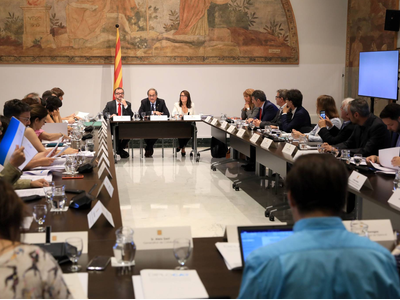- This morning, the head of government chaired a plenary session of Diplocat that approved the 2019–22 Strategic Plan and the work plan for 2019

This morning, the president of the Government of Catalonia, Quim Torra, underscored the important role that the Public Diplomacy Council of Catalonia (Diplocat) plays in raising Catalonia’s profile abroad: “Public diplomacy is essential to continue building Catalonia’s reputation throughout Europe and the world. Open and without intermediaries – that’s when this country really shines.”
With these words, the president brought to close a plenary session of Diplocat held at the Palau de la Generalitat. The meeting was also attended by the Minister for Foreign Action, Institutional Relations and Transparency, Alfred Bosch.
Torra emphasised the potential of Catalonia, a nation with “enviable strength and vitality”, and stressed the importance of “exporting that dynamism and telling people about it beyond our borders”. The president said: “Societies always need to export the best of what they have to offer, but that’s more important than ever now, when human, civil and political rights are being violated by the Spanish state and the eyes of our European neighbours and other countries are upon us.”
In view of these “formidable challenges”, Torra said Catalonia needs “more decision-making power and a stronger voice in multinational bodies” and must “have a greater impact and strengthen connections with other societies”.
At the plenary session this morning, the third since Diplocat was re-established a year ago, the Council approved the Strategic Plan of the Public Diplomacy Council of Catalonia, 2019–22 and the annual work plan for 2019, which were presented by the general secretary, Laura Foraster.
The president said the new strategy was the result of close collaboration between all members of the consortium, which “demonstrates the transversal nature of Diplocat as a tool at the service of the nation”. He also stressed Diplocat’s “commitment to decentralisation and the participation of local actors” in the stage now beginning, priorities that are reflected in a specific plan for the internationalisation of local actors.
Diplocat’s vital work
“The real Catalonia is a Catalonia determined to be and to do – to be free, just, prosperous and equable,” said Minister Bosch. “Today we confirm that Diplocat is continuing its efforts to raise Catalonia’s international profile – a vital task – and that it has the full support of the Government of Catalonia. But it also needs other levels of government and civil society to contribute.”
Bosch said it was essential to defend the vision of “Catalonia as a nation determined to assert itself internationally and learn everything we can from the world” and stressed that “public diplomacy is a basic tool for Catalonia as a nation”. The minister concluded: “After the application of Article 155, we’ve overcome the difficulties we faced, and we’ll continue to do so – together and based on our diversity.”
Approval of Diplocat’s 2019–22 Strategic Plan
Under the slogan “International Dialogue – Connecting, Reaching Out, Building Capacity”, Diplocat’s Strategic Plan for 2019–22 focuses on three lines of action to be pursued using the classic tools of public diplomacy: the exchange of international best practice, visitor programmes, organisation of public activities, capacity-building, and interaction with the media.
Making the most of its transversal nature, the Council has worked closely with all members of the consortium to develop the plan. In addition, in order to decentralise its action and give voice to actors throughout the territory, the new stage includes a specific plan for the internationalisation of local actors. The plan identifies priority thematic areas that are of strategic importance and relate to global issues, including the 2030 Agenda, the new economy, human movements and social cohesion, and areas in which Catalonia is or aspires to be a leader, such as entrepreneurship, sustainable tourism, the social economy, and scientific and technological innovation.
The work plan for 2019 includes the organisation of an international seminar on the role of public diplomacy in the digital age, an international visitor programme that offers journalists a chance to experience St. George’s Day (the National Day of Catalonia) first-hand, a seminar on building a sustainable food system, the organisation of the first edition of an international conference on vocational training in Catalonia, and a grant programme for students of international relations (in its 36th edition this year).
The Public Diplomacy Council of Catalonia (Diplocat) is a public-private consortium that was set up in 2012 to connect Catalonia with the world and promote activities aimed at raising its profile abroad. Diplocat creates links and relationships of trust with the citizens and institutions of other countries. It also encourages Catalan civil society and entities to get involved and contribute to tackling major challenges and global issues, providing incentives to help them strengthen their capacity and become significant actors at the international level and build lasting bridges of dialogue with the aim of listening and being heard.
Diplocat grew out of the Patronat Catalunya Món and its predecessor, the Patronat Català Pro Europa, created in 1982 to focus on Catalan relations with the EU. Over its history and despite the name changes, it has remained a consortium with a plural character.
The consortium is made up of 38 members, including public institutions; business, social, trade union and sports entities; and universities, business schools and other academic institutions.